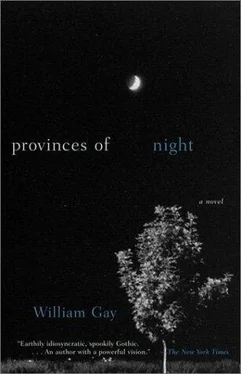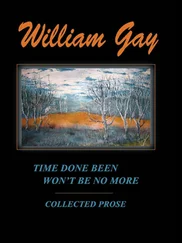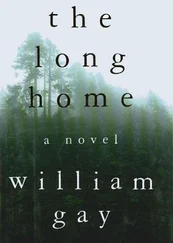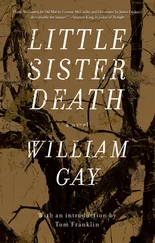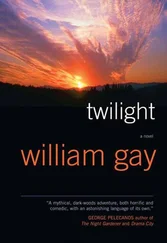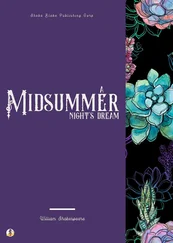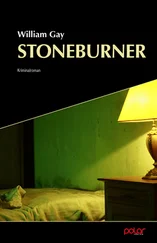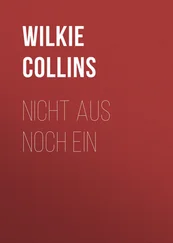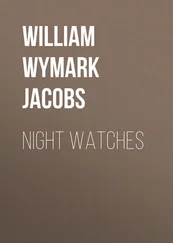I get it slick and then when the water dries off it don’t look like I want it to, Brady said.
You’ll have to let it dry and then polish it with a grinder.
Brady laid aside the trowel and studied him. I reckon you’ve made a world of these things.
That just seems the way you’d do it. I don’t know anything about it, and I never meant anything by it. I know how much you thought of Brownie.
I doubt you do. She was just a dog to you. To me she was family. She was like my child. When I seen the carwheels run over her stomach it was like they was runnin over mine. I felt somethin twist in me, and it ain’t untwisted yet.
How come him to hit her?
Harwood never hit the brakes or nothin. Just drove across her. He’s been onto me about my dogs before. He even had a feller from the post office come out here and talk to me about it. I reckon Harwood thought he’d teach me a lesson. But we’ll see. We’ll see.
What do you mean, we’ll see?
You’ll see too. It’s a omen anyway, bad luck. All because of that old man makin plans to come back here.
It was on the boy’s tongue to say that a person who claimed clairvoyance as strongly as Brady did should simply have gotten up yesterday morning and penned the dog up but he remembered what his grandmother had said and so kept his silence. Then he said: When’s the funeral?
Brady searched his face for guile or irony but Fleming’s face held only a studied bland innocence.
I buried her and said a few words over her this mornin. A few words of scripture then I told her how she’d be avenged. She can rest easy on that score.
Avenged how? You taking Harwood to court?
I’m takin him to a higher court than old Judge Humphreys. I’m puttin a hex on him, already got it in the works. He’s got some hard times ahead of him.
What kind of hex?
He run over Brownie’s stomach and busted her all up inside. She died and died, takin on. I’m goin for Harwood’s stomach, too. His stool will set up in him like concrete, his insides will petrify like wood turnin into rock. If you don’t think that’ll give him reason to think about what he done, then you don’t know nothin about the workins of the human body.
Hellfire, the boy said.
Hellfire is right, Brady said. I don’t know if he’ll die or if he’ll finally get well. I can start em but I can’t stop em. It’ll be out of my hands.
He’s crazy as a shithouse rat, the boy was thinking. And if I don’t get out of here I may catch it myself.
Brady rose and unpocketed a small glass vial. He held it before the boy’s face but did not relinquish ownership of it. Do you know what this is?
It looks to me like a pill bottle.
What’s in it?
The boy looked closer. A Lucky Strike cigarette butt, he said.
Yes and no. It’s Harwood’s cigarette butt. I seen him when he flipped it out and I was on it like a duck on a June bug. It was still afire. Harwood touched it, it’s got his essence all over it, and it’s all I need to put a hurt on him.
The boy rose, simultaneously angry at Brady and yet touched by the grief that ravaged his face. Remind me not to leave anything of mine around where you can find it, he said.
You don’t own anything to leave, Brady pointed out.
For supper the old woman had fried country ham and made red-eye gravy. There were baked yams and huge cathead biscuits that threatened to float out of your hand and tall cold glasses of buttermilk. The boy took a deep breath and buttered up one of the biscuits and fell to and fairly outdid himself eating. Even the old woman seemed mollified by his performance. If I can keep you around for two weeks I’ll have you lookin very nearly like a human bein, she said.
And the rest of us knockin at the poorhouse door, Brady said sourly.
After supper they sat on the front porch and watched a long purple twilight descend on the world, swallowing the distant treeline first and sweeping across the fields toward them like mauve clouds. The boy watched the known world of shape and form vanish like something slowly dissolving in acid.
You mind if I listen to the radio?
Why Lord no, boy. You just help yourself.
He found the Grand Ole Opry out of Nashville, fiddles and guitars and advertisings for miraculous patent medicines. Country comedians that made him smile faintly, his eyes closed, sitting in an old willow rocking chair, here in this house of the dead and dying. Here within these walls time was of no moment. The walls were adorned with calendars but they had measured years already immured in memory, five years old, ten years old. The house was full of clocks but some of them were stopped and of the ones that worked no two kept a similar hour. A simple request for the time of the day was a cause for consternation, for much comparing of the accuracy of one clock with another to arrive at some approximation of the hour. Here time did not matter. Here another set of rules was in order, out of another century.
Right out that window’s where I seen that warnin that night, the old woman said. He opened his eyes. She had come in silently and she was reaching a cup of coffee toward him and in her other hand she held one of her own. The coffee was black and so strong it seemed to have its own thick viscosity. He imagined the spoon he stirred it with vanishing away to nothing.
You always made the strongest coffee.
If I wanted to drink muddy water I’d just drink muddy water.
He sipped from his coffee. What was it a warning of? he asked, though he knew, knew all this by rote.
It was when old Mr. Bloodworth, Elbert’s daddy, that would have been your great-granddaddy, was laying abed. He’d had pneumonia but the night I’m speakin of he seemed to be some stronger. He’d knowed Elbert that day and spoke a few words. He was layin right there by that window, in that very bed.
When the boy looked at the daybed a cold bone hand lay on his shoulder, ice crept the back of his neck. The window had gone opaque with night, reflected light threw the room back at him, a dark gangling boy and an old woman holding coffee cups.
It was nearly one o’clock in the mornin. Everbody was asleep but me, I was settin up with Mr. Bloodworth. It was hot, in August, and so stiflin you couldn’t hardly breathe. Heat lightnin in the west. That was before Warren got the electricity and we didn’t have no fan or nothin. I looked about Mr. Bloodworth and thought I’d go stand in the door a minute to see if I could get any air and that was when I seen it.
Brady was reading a farm magazine or pretending to but as well seemed transfixed by the old woman’s voice. His glasses had slipped far down his nose and he had stopped turning pages.
It was a white shape. Like a woman in a white dress or gown. It was comin across that field on the other side of the garden there, kind of glidin, comin faster than a person could walk. But when it come to the garden fence it stopped like it was goin between the woven wire and the strand of bobwire at the top, the woven wire was loose there then and it was just like a person pushin the wire down and climbin through it. Mr. Bloodworth made some kind of a racket and that brought me to myself. I turned around and when I looked back Mr. Bloodworth was settin up in bed lookin at the window there. Then he just fell back with his eyes open. He had died.
I always wondered why a haint or a warnin had to crawl through a barbed wire fence, Brady said. It looks to me like it would just hit that fence like it never amounted to nothin and keep on goin.
I never made the world, the old woman said irritably. I don’t know why everthing does what it does. All I know is what I seen.
Before he went up to the attic to bed he went outside for a time in the deepening silence. Far to the south lightning flared and died in photoelectric brilliance, relit the clouds briefly before the night sucked them back down to darkness. So far away no thunder came, so far away it was unreal. He thought of dark hollows, lightning on rainwet leaves, rain, and Boyd crouched for shelter under a dripping cedar, his fierce vexed face already impatiently scanning the night for a road the lightning might show him.
Читать дальше
